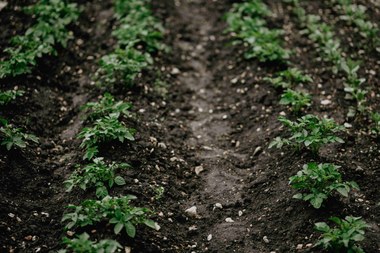Already a decennium of climate-neutral farming in Belgian
(18-12-2020) The Bayer Forward Farm in Huldenberg has been producing climate-neutral potatoes for 10 years, according to a study by our faculty. The farm has succeeded in this thanks to various innovative techniques.
The agricultural sector can make an important contribution to Europe's ambition to become the first climate-neutral continent in the world by 2050. Not only must we achieve more with less, but we must also first identify the biggest factors that contribute to this on a farm. Within the framework of the Bayer chair, a team of bioengineers from Ghent University therefore examined the carbon flows for the production of potatoes from 2005 until now at the Bayer Forward Farm in Huldenberg. What did they find? Thanks to higher yields via the use of better plant varieties and optimized crop protection, but mainly thanks to a more efficient use of diesel and less mineral fertilizer per ton of potatoes, the farm has been producing climate-neutral potatoes since 2010.
Agriculture, and arable farming in particular, is one of the economic sectors that will be the first to feel the negative effects of global warming. Take for example, the current groundwater level in Flanders, which has still not recovered from the prolonged droughts in recent years. Therefore, the agricultural sector has every interest to be part of the solution and to contribute to the ultimate goal of the European Commission (EC), a climate-neutral Europe in 2050.
That 30-year term still seems a long way off, but within one decade the EC already has the ambition to reduce greenhouse gas emissions by at least 55% compared to 1990. That is a very big challenge. Fortunately, the sector has already come a long way. However, how far is the progress that agriculture in Flanders has already made today?
According to figures from the Flemish Government, Flemish agriculture and horticulture have already achieved a reduction in greenhouse gas emissions of about 20% since 1990. In the last 10 years, this downward trend has not only stagnated, but emissions have even increased slightly to a share of 10% of the annual emissions of Flanders. In order to take further steps and achieve the climate objectives, it is therefore important to examine in detail which measures at the level of a farm can have the greatest effect. For this reason, a team from the Faculty of Bioscience Engineering at Ghent University (UGent) used life cycle assessment (LCA) to examine all carbon flows for the production of potatoes from 2005 to the present day at 'Hof ten Bosch', the Bayer Forward Farm in Huldenberg.
"LCA is a standardized method based on international conventions for assessing the footprint of product systems", says Dr. Ir. Rodrigo Alvarenga of the research group STEN ('Sustainable Systems Engineering'). "In doing so, we usually take into account all processes related to the entire product life cycle and all relevant impacts on the environment. The analysis therefore starts before certain inputs, such as fertilizers or crop protection products, arrive at the farm and only ends once the final products are discarded or consumed. In order to be able to compare all these different factors, we express them in ktonnes of CO2 equivalents (CO2-eq)".
For the analysis of the footprint for the production of 1 metric ton of potatoes at 'Hof ten Bosh', the researchers applied a 'Cradle-To-Gate' concept. "This means that we took into account the entire production process and the storage of the potatoes on the farm, but not the further processing or consumption", according to Rodrigo. In order to also be able to perform that analysis, additional data would be needed from higher up the value chain. In addition, most of the used data can be attributed exclusively to potato cultivation, such as fuel consumption, but others were obtained by extrapolating the averages over a five-year crop rotation, such as for the storage of carbon as organic material in the soil.
If we compare Hof ten Bosch's emissions over three five-year periods, we see a significant improvement in the carbon footprint, from 75 kg CO2eq/ton of potatoes in 2005-09, to 66.3 kg in 2010-14 and only 56.8 kg in 2015-19," concludes Rodrigo. "A reduction of nearly 25% in 15 years mainly due to higher potato yields and more efficient use of mineral fertilizers and diesel. In the same period measures were also implemented to enhance the carbon sequestration in the soil via compost and by applying reduced tillage. When we also include CO2 storage in the soil over the last two periods, we even see negative emissions of -5.6 and -9.9 kg CO2eq/ton of potatoes. This means that Forward Farm has been producing climate-neutral or even slightly climate-positive potatoes for a decade now!
What about other arable farms in Flanders or Belgium? "We see that there is still some work to be done there," says Lieselot Boone, another researcher from the team. "The Forward Farm currently emits about half of the average Belgian potato production system (110 kg CO2eq/ton) and scores even better than the best performing system in an international database, the Swiss integrated production system (64 kg CO2eq/ton)".
This study was carried out in the framework of the 'Bayer ForwardFarming' chair. With this initiative, UGent and Bayer want to link scientific insights to practical knowledge in order to make Belgian agriculture more sustainable and to arm it against the challenges of the future. In addition, Bayer's ambition is to be climate-neutral by 2030 and to help farmers reduce their emissions by 30% by then. Farmers who are interested and who want to become part of the solution are welcome to come take a look in Huldenberg!

